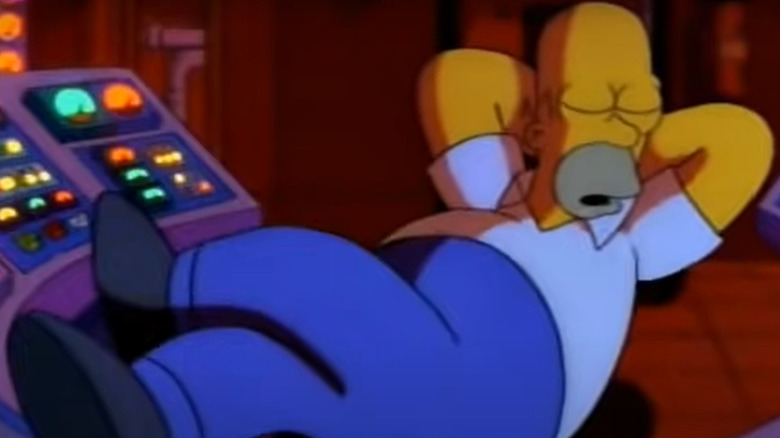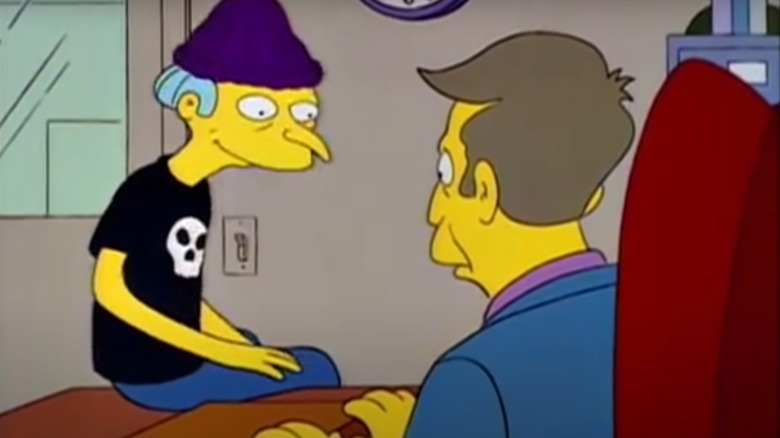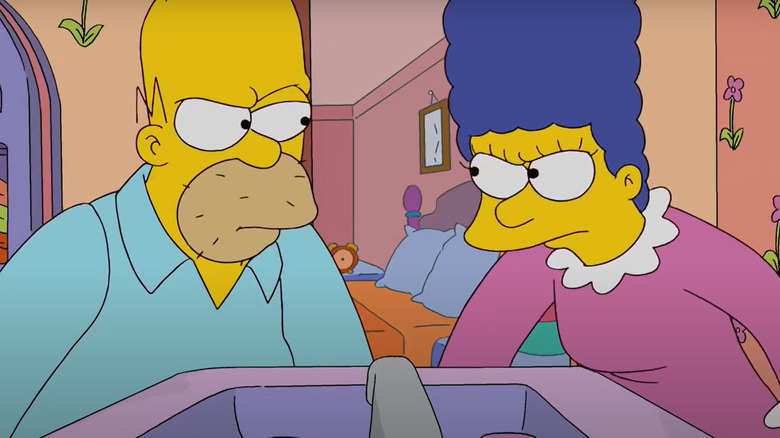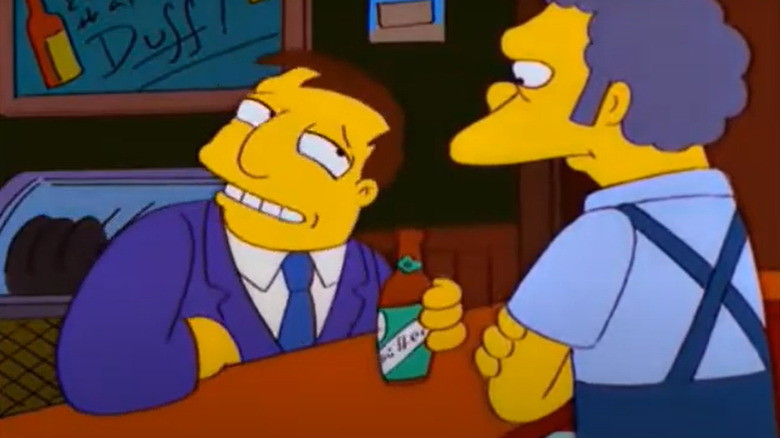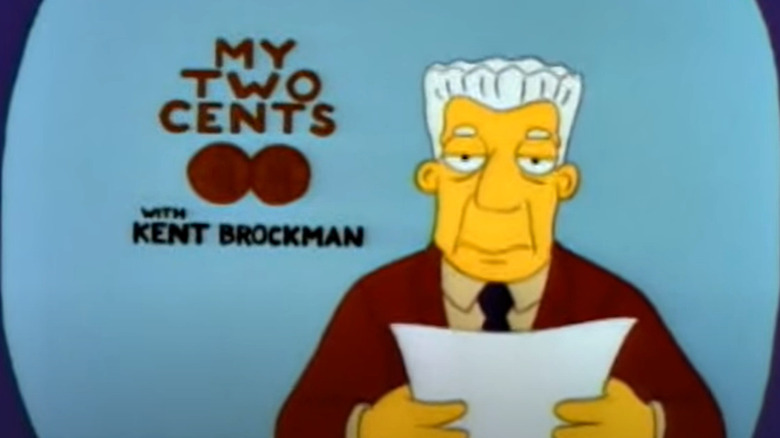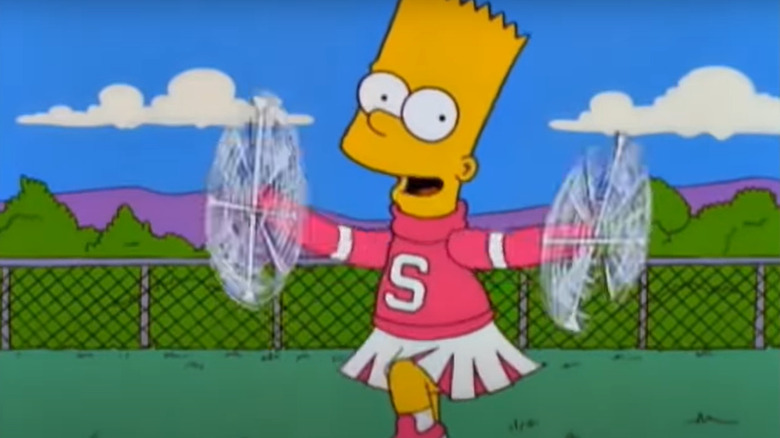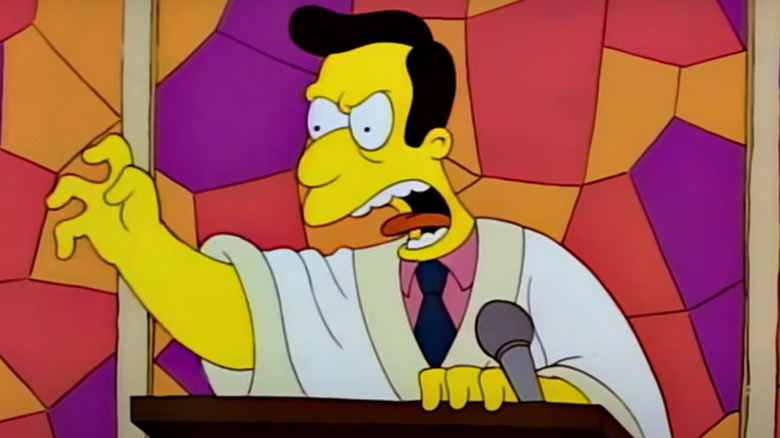Questionable Things We Ignore In The Simpsons
"The Simpsons" has been a massive part of popular culture for more than thirty years, and still shows no signs of slowing down. What started off as a satire of American family life in 1989 has since grown into something more akin to a force than a mere TV show. From producing numerous catchphrases ("meh," "d'oh," etc.) to predicting the future numerous times, the impact that "The Simpsons" has had on real life is incalculable.
One of the reasons behind the show's enduring popularity is its ability to remain fresh and, quite often, edgy. "The Simpsons" has always had a reputation of taking chances and pushing boundaries, even stirring up the occasional controversy in its quest to produce as many laughs in its 22-minute runtime as possible. And while the show has lost some of its biting humor in recent years, it still knows how to poke fun at many of our sacred cows.
But because "The Simpsons" has such a long history of serving as society's jester and wandering into risky subjects, we've become accustomed to many dubious aspects of the show. These range from small things, like the wacky logic that's so prevalent in animated shows, to much bigger and even uncomfortable things. And while we still love "The Simpsons," here are some of the more questionable things about it that we ignore.
Homer's constantly strangling Bart is extreme child abuse
One of the show's longest running recurring gags is Homer strangling Bart. In fact, this gag goes all the way back to the very first episode of the series, "Simpsons Roasting on an Open Fire" — during the end credits when the family is singing Christmas carols, Bart and Lisa frequently interject the festive songs with childish remarks, making Homer angrier and angrier. And when Bart interrupts "Rudolph the Red Nosed Reindeer," Homer snaps and is heard strangling Bart, yelling "Why you little!" While all of this takes place offscreen, it's pretty obvious what's going on to anyone who's seen more than a couple of episodes. Since then, Homer has strangled Bart on nearly countless occasions for even the slightest reasons, like when Bart mails a nasty letter to Mr. Burns (that he wrote with Homer, no less), to Bart intentionally mispronouncing "daddy" when he was a baby.
While the sight of a grown man freaking and strangling his young son over such trivial things has never failed to delight audiences for decades, it's still a disturbing gag when you think about it. And considering Child Protective Services have only intervened once (in "Home Sweet Home-Dum-Diddly Doodily") for reasons that have nothing to do with the constant strangling, one has to wonder what kind of long-term damage this constant life-threatening will do to Bart.
How Homer has kept his job at the nuclear power plant for so long
Homer Simpson is, somehow, the safety inspector at the Springfield Nuclear Power Plant. He's constantly sleeping on the job, is extremely negligent, and frighteningly forgetful ... and somehow he's managed to keep his job despite the constant danger he's put his fellow coworkers, as well as the entire town, in.
In "Homer's Enemy," new employee Frank Grimes is flabbergasted at how Homer's clumsiness should've killed him multiple times, to which Lenny replies, "Eh, 316 times by my count." Frank even points out that "accidents have doubled every year since he became safety inspector. And meltdowns have tripled!"
To be fair, Homer has been fired from the Springfield Nuclear Power Plant several times. However, he keeps getting rehired. Homer seems pretty well liked there, so maybe his colleagues are more willing to give him second, third, fourth, etc. chances. But surely someone in the media would notice how many near-nuclear disasters have been caused by Homer by now, right? Also, Mr. Burns is quite the penny-pincher — doesn't he realize how costly it is to have such a liability working for him?
Mr. Burns is how old?
Another hilarious yet dubious recurring gag on "The Simpsons" is Mr. Burns' constantly shifting age. One of the earliest instances when his age is explicitly mentioned is in the second season episode, "Simpson and Delilah," when it's revealed that he's 81 years old. However, this soon contradicted; for example, in "Who Shot Mr. Burns? Part One," Mr. Burns is said to be 104 years old, then again in "Fraudcast News," when he nebulously mentions that he's "been 89 for a while now." However, the gag is at its funniest when his advanced age is implied rather than directly stated, like in the episode "$pringfield (Or, How I Learned to Stop Worrying and Love Legalized Gambling)," when Mr. Burns says that he's "lived through twelve recessions, eight panics, and five years of McKinleynomics."
This may very well be the inevitable result of a show that's willing to sacrifice logic and continuity in order to score more laughs. This is not necessarily a bad thing, considering "The Simpsons" is first and foremost a comedy. However, the matter of Mr. Burns' age is a confusing one; while most characters in the show don't really age, Mr. Burns' age shifts forwards and backwards. He certainly can't be blamed for being a little embarrassed of how old he is, but constantly lying about his age by decades is a major stretch.
Marge should've divorced Homer by now
Homer and Marge Simpson must have a marriage counselor on speed dial, because there have been countless times when Homer has done something horrible that was grounds for divorce.
In "The Cartridge Family," Homer promised to protect his family after a massive rise in crime in Springfield ... and then gets a gun. After Marge pleads with Homer numerous times to practice basic gun safety (e.g. no guns at the dinner table), she makes him get rid of it. However, all he does is hide it, further straining their relationship before he finally chooses his family over the gun.
In "Viva Ned Flanders," Homer and Ned impulsively take a trip to Las Vegas where they engage in all sorts of debauchery, not least of which is marrying other women behind their wives' backs. While it doesn't seem that anything physical happened between the two husbands and their Vegas wives, Homer still keeps Marge in the dark about it until they show up in Springfield to wreak havoc on their lives.
These are just a couple of the genuinely terrible things Marge has had to put up with during her marriage to Homer. It should be noted that the idea of splitting up the couple was touched on in "A Milhouse Divided" and "Every Man's Dream," but so far it looks like Marge will stick around to put up with Homer's selfish and dangerous behavior.
Homer and his brain are separate entities
Homer has an ... unusual relationship with his brain. In fact, it's almost like they're two completely different entities. While their interactions have varied over the years, his brain has generally been portrayed as smarter than him and has even given him good advice from time to time.
For example, there was one time when Homer accidentally tossed his last peanut behind the couch and he went searching for it. When he expresses disappointment over finding a $20 bill, his brain reassures him that this is the better option as it would buy many peanuts. Homer, still not sure about how legal tender works, asks how, to which his brain replies, "money can be exchanged for goods and services."
Another shining example of Homer and his brain operating on totally different wavelengths is when Homer gets into a car accident in "Mr. Plow." When asked by an insurance representative what Homer was doing so late at night just prior to the accident, Homer struggles to get out of saying he was at Moe's before stating he was at a pornography store. Homer's brain, impressed, says, "heheheh, I never would've thought of that."
There's no need to get into questions of neuroscience and consciousness when analyzing the thinking of a cartoon character, but it's safe to say that Homer's relationship with his brain is abnormal.
Mayor Quimby is obvious corrupt, yet Springfield keeps voting for him
Politicians have a long history of being corrupt, greedy, philandering, and dishonest, but none have ever matched the depravity of Mayor Quimby.
When conservative radio host Birchibald T. Barlow is listing things in Springfield that are never going away, he mentions the city's "six-term mayor. The illiterate, tax-cheating, wife-swapping, pot-smoking spendocrat, Diamond Joe Quimby." Quimby, who happens to be listening to the radio show while watering his marijuana plant, responds with, "Hey! I am no longer illiterate."
As awful as Quimby is as the mayor of Springfield, at least he sometimes admits his faults, even if he doesn't take responsibility for them. For example, he once publicly owned up to the fact that he "used the city treasury to fund the murder of his enemy." Of course, he brushed aside the seriousness of his crime by quoting a popular kids' show character by saying that he's "a bad widdle boy," which somehow was enough to win his reelection by a landslide (the newspaper announcing the results of the mayoral race also mentions that "two more bodies surface in Springfield harbor").
This brings us to a questionable scenario: Not only do the citizens of Springfield know how vile Quimby is, but that they voted for him six times. Let's just hope that Quimby's publicist has gotten a huge raise.
How has Lisa not skipped ahead multiple grades?
It's no secret that Lisa Simpson is one of the smartest characters in the show, and is certainly the smartest member of the family — frequently giving sage advice to her elders. In fact, when Homer welcomes Frank Grimes to the Simpson house for dinner, he introduces Lisa as having an IQ of 156, which is impressive not just for a child, but for any human being ever (for reference, Albert Einstein's IQ is sometimes thought to be around 160).
There are plenty of references to Lisa's stellar smarts throughout "The Simpsons," going all the way back to when she learned how to change her own diaper while still a baby. There's also the time a teachers' strike closes down Springfield Elementary School, so out of a desperate need to challenge herself, Lisa builds a perpetual motion machine that Homer says "just keeps going faster and faster." And in the episode, "Little Girl in the Big Ten," Lisa demonstrates that she's more than capable of passing as a college student.
To be fair, "The Simpsons" briefly touched on this issue, in the episode "Bart vs. Lisa vs. the Third Grade," when Bart is sent back to the third grade while Lisa is moved up to the third grade. However, this didn't happen until Season 14 of the series. And so, because of cartoon logic, it looks like Lisa will be forever trapped within the confines of a elementary school curriculum.
Springfield's location keeps changing
Like Mr. Burns' real age, it seems we'll never know the truth of where Springfield is, other than the fact that it's in the United States. However, there's no denying that its shifting location has resulted in some great laughs.
In the episode, "Behind the Laughter" (a parody of VH1's "Behind the Music"), the narrator refers to the Simpsons as a "northern Kentucky family," which can mean that it's where they originally came from and not necessarily that it's where they live. Further confusing things is when, in "The Simpsons Movie," Ned Flanders claims that there are four states that border Springfield: Ohio, Nevada, Maine, and Kentucky. There is no state that is surrounded by these four states, so the writers are clearly having fun torturing the audience with this misinformation.
Eagle-eyed viewers may notice the handful of times that ZIP and area codes are referenced in the show, but even those are misleading. Hans Moleman's driver's license is seen in the episode, "Selma's Choice," reading "Springfield, USA, 90701," but the ZIP code is for the Southern California cities of Artesia and Cerritos. In "A Tale of Two Springfields," the city is split into two area codes: 636 and 939, which are real life area codes for St. Louis, Missouri and Puerto Rico, respectively.
At this point, it's probably more logical to assume that the city itself is pulling up stakes and moving around the continental US every few years.
Kent Brockman's terrible way of prioritizing urgent news
Kent Brockman is yet another example of a prominent Springfieldian who somehow manages to keep his job despite being so bad at it. Seriously, people who don't watch any news at all have a better chance of being updated on what's going on in the world.
One of his biggest flaws as a news anchor is his deadpan delivery — or even outright omission of — urgent and disastrous news. For example, in "Bart Gets Famous," Kent opens his program with, "on the 11:00 news tonight, a certain kind of soft drink has been found to be lethal. We won't tell you which one until after sports and the weather with Funny Sonny Storm!"
Another one of Kent's biggest flaws as a news anchor is his decision to give more weight to trivial news. "Lisa vs. Malibu Stacy" sees the reporter dedicating an entire segment to the new Lisa Lionheart doll that had just been released, before making a casual remark about something much more newsworthy: "Oh, and the President was arrested for murder. More on that tomorrow night. Or you could turn to another channel."
If this is who Springfield turns to in order to stay updated on current events, it's no wonder why the city has a League of Uninformed Voters.
Bart Simpson should've been expelled multiple times
Springfield Elementary School must have the most forgiving faculty when you take into account the seemingly infinite number of destructive and mean-spirited pranks Bart has pulled over the years.
To be fair, Bart was expelled fairly early on in the history of the show, in the episode "Whacking Day." That was for stealing Groundskeeper Willie's tractor and ramming it into Superintendent Chalmers' behind, who just happened to be conducting an inspection on the school. However, Bart manages to impress Principal Skinner by episode's end and is allowed back at the school. Permanently, it seems.
In "Bart's Comet," the Bartman humiliates Principal Skinner in front of the entire school with his own weather balloon. And his punishment? Bart is forced to join Skinner at 4:30am every morning to help him with his amateur astronomy. Other expulsion-worthy acts include warping the basketball court after flooding the gymnasium; connecting many megaphones together on a field trip to the police station, which results in a blast of feedback that causes damage all around the city; and setting up life-threatening traps for the substitute teachers during the teachers' strike.
Reverend Lovejoy is a terrible priest
Reverend Lovejoy is one of the most judgmental characters on the show, and that's why we love him. However, his overly critical personality also makes his flaws all the more apparent.
Lovejoy is pretty arrogant when it comes to his Christianity and can be quite contemptuous towards people of other faiths. He referred to Lisa Simpson as "Marge Simpson's devil-daughter" when she became a Buddhist, and even got into a fistfight with a Catholic priest. However, despite Lovejoy's seeming devotion to Christianity, he has at times displayed a casual attitude towards his own religion; he's referred to the Bible as a "2000-page sleeping pill," and suggested that Ned Flanders convert to another religion as "they are all pretty much the same."
And let's not forget the fact that Lovejoy treats his parishioners like dirt. When he first became a priest, he was enthusiastic about assisting them with their problems, but soon became disenchanted with assisting anyone after years of Ned Flanders' constant pleas for help. Lovejoy has also been overly pushy about getting donations from his congregation, and has no shame about giving members of his flock erroneous biblical lessons.
Surely there are better religious leaders and spiritual guides in Springfield that its citizens can turn to besides the guy who encourages his dog to defecate on his most devoted attendee's lawn, right?


